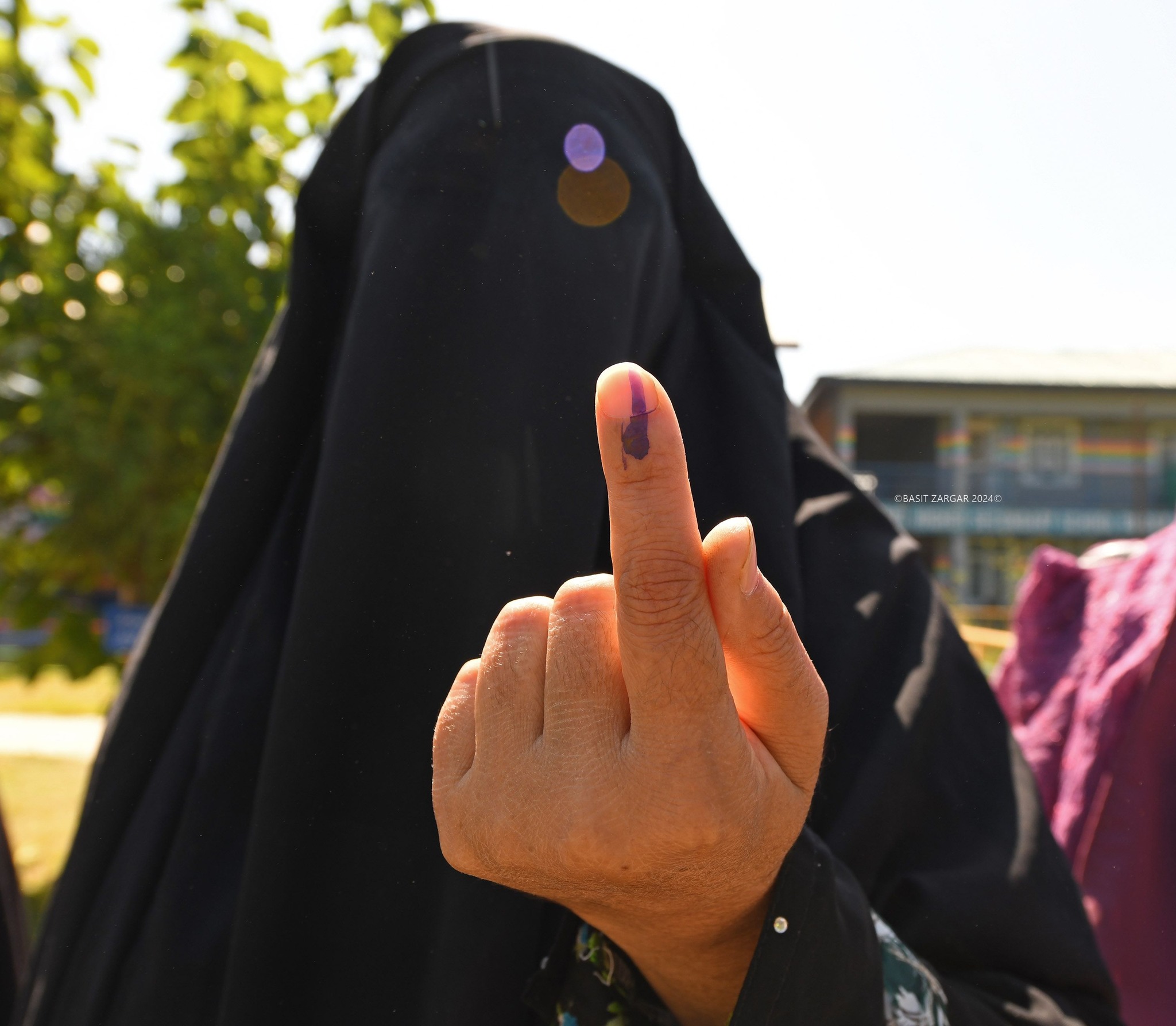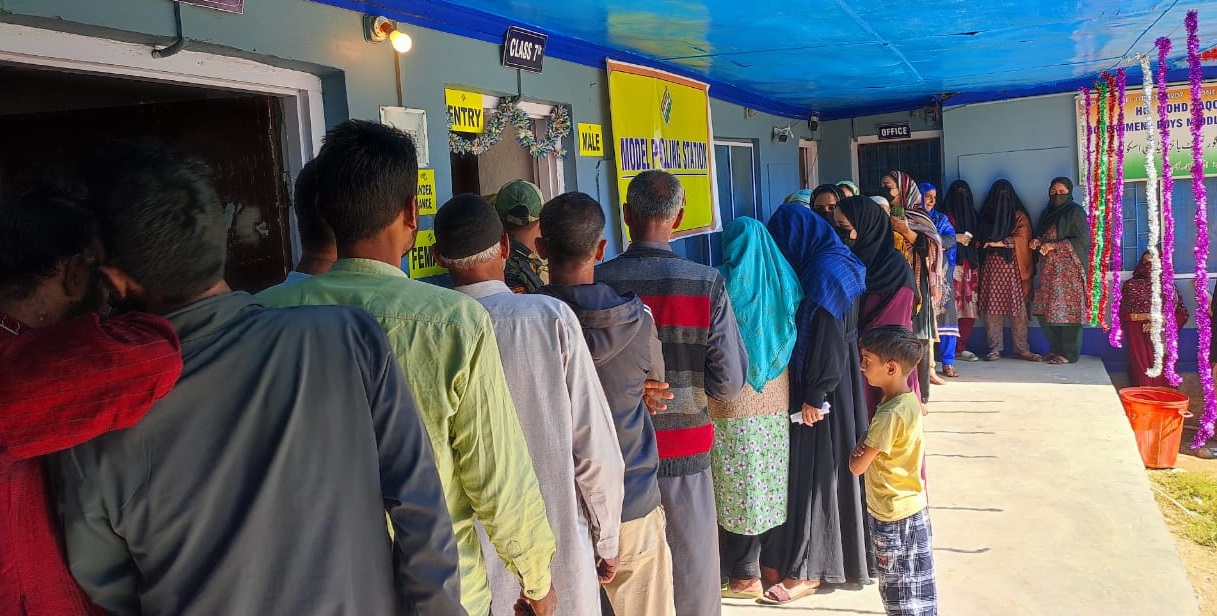South Kashmir, long known for low voter turnout, has experienced a dramatic increase in participation. The region’s renewed engagement reflects a broader shift in J&K’s political landscape.
In a major development in Jammu and Kashmir, Chief Electoral Officer P.K. Pole announced that the first phase of the Assembly elections recorded a strong voter turnout of 59%, with the possibility of a slight increase as final numbers are tallied. This year’s polls reflect a district-wise breakdown, thanks to the completion of the delimitation process, which ensures that no constituency now spans two districts.
Across the 3,276 polling stations, including 23 special booths for migrant voters—19 in Jammu and four in Delhi—the Election Commission has been gathering figures. Pole emphasized that South Kashmir, previously known for dismal voter turnouts often in the single digits, saw a significant rise in participation compared to past elections. “The increased turnout in South Kashmir is a promising sign of electoral engagement,” Pole said, hinting that voter enthusiasm may continue to rise in the next two phases.
In a breakdown of the voter turnout by district, Anantnag recorded 54.17%, Kulgam saw 61.7%, Pulwama registered 46.03%, and Shopian reached 53.64%. On the Jammu side, Doda saw 69.33%, Kishtwar led the pack with 77.23%, and Ramban recorded 67.71%.
Pole attributed the higher-than-expected voter turnout to a combination of factors, including peaceful conditions, dynamic campaigning by the candidates, and the comprehensive awareness efforts led by the Election Department. These efforts were designed to inform and encourage voter participation, especially in regions with historically low turnout.
In a striking comparison to previous elections, the turnout in this phase has exceeded those in the Lok Sabha elections of 2009, 2014, and 2024, as well as past Assembly elections of 2008, 2014, and 2024.
Looking at individual constituency figures, Kulgam stood out in Kashmir with the highest turnout at 62.7%, while Kishtwar in Jammu topped the list with a 77.23% voter turnout. Some notable statistics included Pahalgam at 67.86%, D.H.Pora at 68%, and Pulwama at 50.42%, while in Jammu, Inderwal recorded a staggering 80.06%.
As for any disturbances, Pole reported that the polling process remained largely incident-free, with only minor issues in Kishtwar, which were swiftly resolved by local authorities. He credited the smooth process to the effective deployment of central forces and police.
“The Election Department’s aggressive awareness campaign across J&K has paid off, and we’re expecting even higher numbers in the upcoming phases,” Pole concluded, expressing confidence in the growing momentum for electoral participation.
No More Election Boycott
Jammu and Kashmir on Wednesday witnessed a momentous event as voters came out in unprecedented numbers, including many who had never participated in the electoral process before. It was the region’s first election in a decade, the first after the revocation of Article 370, and the first since Jammu and Kashmir was reconstituted as a Union Territory. Despite past electoral boycotts and threats of violence, all 24 assembly constituencies saw robust participation, signaling a transformative moment in the region’s political landscape.
For decades, Kashmir had been a region where elections were marred by boycotts and the ever-present specter of terrorism. But today, after ten years, the sight of voters lining up at polling stations spoke of a renewed sense of hope. According to the Kashmir News Observer (KNO), voting took place across 24 assembly constituencies spread across seven districts. This includes districts like Shopian, Tral, and Pulwama—areas once resistant to the electoral process due to high insurgency.
This election is significant not only for the ten-year hiatus but also for the broader shift following the revocation of Article 370, which granted special status to Jammu and Kashmir. The change in the political structure has infused a fresh sense of optimism, resulting in widespread voter engagement.
The first phase of polling, held on Tuesday, saw an overall turnout of 58.85%. This marks a notable shift in voter behavior compared to previous elections. In 2014, Anantnag district had recorded a voter turnout of 39.7%, but in 2024, this figure jumped to 54.17%. Similarly, Pulwama, a region severely affected by conflict, saw voter participation rise from 38.1% in 2014 to 43.87% this year.
Lieutenant Governor Manoj Sinha lauded the voter turnout, calling it a “historic moment” for Jammu and Kashmir. In his statement, Sinha emphasized how the elections represented the strength of Indian democracy, showcasing a transformation in the region from one of fear and conflict to one where democratic rights are proudly exercised. “Record polling in the peaceful, free & fair election attests to the strength of Indian democracy & people’s faith in democratic values,” Sinha tweeted. He praised the contributions of the security forces, Jammu and Kashmir Police (JKP), and election officials for ensuring the smooth conduct of the elections. Special recognition was given to first-time voters, particularly women, who participated in large numbers.
In this election, 219 candidates vied for 16 assembly constituencies in Kashmir and eight in Jammu. Over 23.27 lakh eligible voters were registered, with 3,276 polling stations set up to facilitate the electoral process. The elections took place across key districts like Anantnag, Pulwama, Shopian, and Kulgam in the Kashmir region, as well as Doda, Ramban, and Kishtwar in Jammu.
The demographic composition of voters also played a significant role, with a substantial proportion of young voters between the ages of 18 and 29. This group included 1.23 lakh first-time voters, signaling the growing political engagement of the younger generation. Furthermore, the inclusion of 60 third-gender voters and 28,309 persons with disabilities (PWD) underscored the region’s efforts toward an inclusive democratic process.
Hopes of the Sikh Minority
In the initial phase of the assembly elections, members of the Sikh community residing in various villages across the Anantnag district of south Kashmir took to the polls, driven by the hope that the incoming government will recognize their long-standing plea for minority status.
As they cast their votes, the community members expressed a collective desire for a representative who will champion their cause for the inclusion of Punjabi as an official language in the region. This issue has been a significant concern for the Sikh population, who have felt consistently marginalized.
Sadbir Singh Sodi, a voter at the Bongund polling station in the Mattan area, articulated the community’s frustrations and aspirations. “Historically, we have been overlooked by every government. However, this time around, we hold onto the optimism that our request for minority status will be addressed. Achieving this status would entitle us to job reservations within Jammu and Kashmir,” Sodi remarked. He further emphasized that the Sikh community has persistently sought the recognition of Punjabi as an official language. Despite their continuous appeals, these requests have been largely ignored. “In Anantnag district alone, Sikhs inhabit 14 villages, yet we often feel that our presence is undervalued,” he added.
Another voter, Tablog Singh, highlighted the broader implications of these demands. “Development is a fundamental right for every individual, but the Sikh community has specific needs that must be addressed,” he said. Singh underscored that the new government should prioritize these long-standing demands for minority status and the official recognition of Punjabi. “We approached the polling booths with the hope that our issues would finally receive the attention they deserve,” he concluded.
Jamaat-e-Islami Rejoins Democratic Process
In a significant development, Jamaat-e-Islami has reengaged with the democratic process after a hiatus of 37 years. The party had distanced itself from elections as a protest against alleged electoral fraud in 1987, a stance that it maintained for nearly four decades. This decision to rejoin the process was confirmed by the party’s spokesperson on Wednesday.
Shamim Ahmad Thoker, the head spokesperson for Jamaat-e-Islami’s panel, spoke to a local news agency while casting his vote in Thokerpora, Pulwama. Thoker emphasized that voters are now presented with a crucial opportunity to participate in the electoral process after a decade of disengagement. He noted that there has been a noticeable vacuum in democratic representation, which needs to be addressed to resolve both national and local issues effectively.
Thoker expressed optimism about this year’s voting turnout, highlighting that Jamaat-e-Islami’s participation in the elections marks a significant shift after a prolonged absence. He stressed the importance of an elected government in addressing pressing issues and encouraged a strong voter turnout to ensure a representative government.
Although Jamaat-e-Islami does not have candidates in Rajpora, Thoker explained that their alliance with the Awami Ittihad Party (AIP) means they are supporting AIP candidates, while AIP is reciprocating by backing Jamaat-e-Islami’s candidates where AIP does not field its own contenders.
Thoker elaborated that Jamaat-e-Islami’s boycott of the elections was not due to opposition to the democratic process itself, but rather as a reaction to the perceived electoral fraud in 1987. The party’s disengagement was intended as a protest against the rigging that marred the elections that year.
He criticized the lack of condemnation from governmental bodies and institutions regarding the 1987 rigging. However, Thoker acknowledged a recent positive shift: for the first time since 1987, the establishment reached out to Jamaat-e-Islami, promising fair elections. This assurance was a pivotal factor in the party’s decision to reenter the electoral arena.
Reflecting on the recent parliamentary elections, Thoker praised the transparency of the process, which he believes restored faith in the electoral system. He recalled that in 2014, Jamaat-e-Islami’s leader, Mohammad Abdullah Wani, had stated that the party would consider contesting elections if they were assured of fairness. At that time, no such assurances were given, but the recent engagement by government institutions has encouraged the party’s return to active political participation.


Leave a Reply